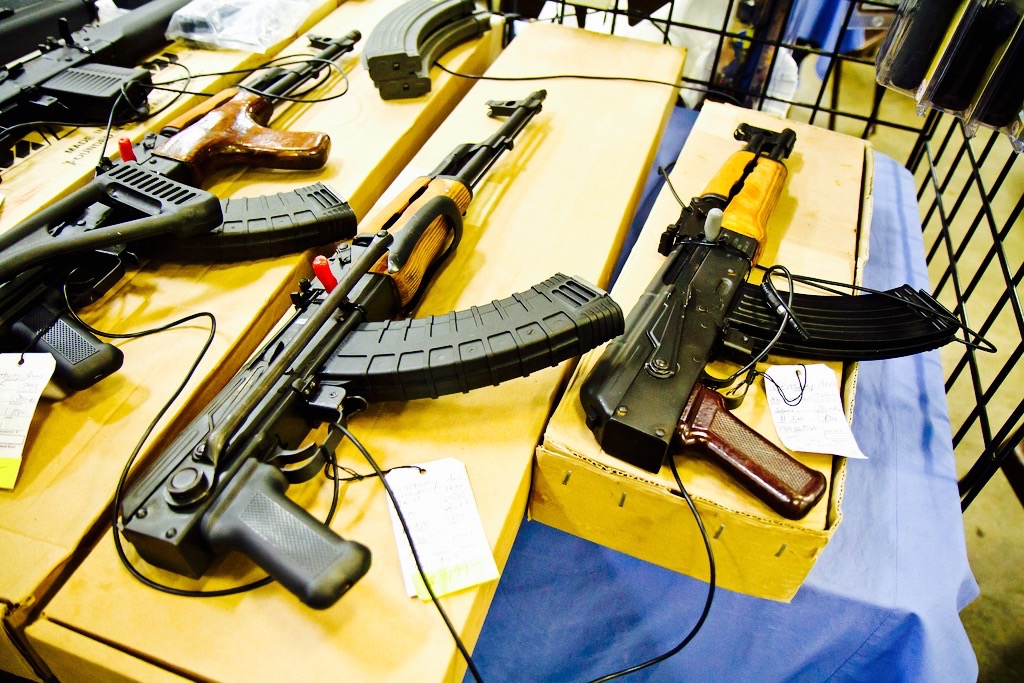As gun violence takes an increasingly prominent role in the 2016 presidential election, Hillary Clinton has promised to make reducing it a priority should she end up in the White House. The leading Democratic candidate issued a raft of gun-related policy proposals on October 5, many of which she vowed to put in place through executive action. Among them is a call to increase scrutiny of “high volume” private gun sellers. Clinton would have those individuals who sell a “significant number” of firearms deemed “in the business” of selling guns, compelling them to obtain a federal firearms license (FFL) and perform a background check with every transaction.
Under current federal law, a person is “engaged in the business” of selling firearms if a large part of their livelihood comes from gun sales, but not if they make occasional sale or trade while maintaining a personal collection. But there’s no particular number of sales that marks someone as “in the business,” as opposed to a hobbyist. A Clinton aide told the Huffington Post that as part of her proposal, federal bureaucrats could define a number during the rule-making process.
The Bureau of Alcohol, Tobacco and Firearms (ATF) has successfully identified and prosecuted some particularly flagrant unlicensed gun dealers. According to data provided to the Trace by the ATF, the Bureau recommended 57 cases of dealing without a license in fiscal year 2015, down from a peak of 87 cases recommended in 2012. A look at the federal docket provides a few recent examples of just how far they can go without becoming part of the background check system:
The “Darknet” Dealer
This past June, Alabama resident Michael Albert Focia was convicted of illegally selling 15 to 25 guns without a license after he agreed to transfer weapons to ATF agents posing as gun buyers on an encrypted website called Agora. At his upcoming sentencing hearing, he faces up to 15 years in prison.
The Crooked Cop
From 2008 to 2011, McGowan, a former Sacramento County Sheriff’s Deputy, worked with FFL holder Robert Snelling to use his law enforcement background to get around California’s strict rules prohibiting certain models of guns from being sold in the state. He bought 41 guns during that period, reselling 25 in less than a year after purchase. McGowan was convicted in June. A co-conspirator and fellow deputy, Thomas Lu, plead guilty in 2012 to participating in the same scheme, selling 23 guns that were models blacklisted by the state.
The Heedless Judge
Former Texas county judge Timothy L. Wright confessed to selling more than sixty guns, starting in June 2014 and running up to his indictment this May. The ATF caught on to Wright well before he faced charges, telling him he had to apply for an FFL in September of last year. Despite the warning, Wright was already in the process of straw purchasing two Glocks, another federal crime. In December, Wright — still sans license — sold another gun but fabricated records to say he’d completed the sale before he was approached by the ATF. He was sentenced to 18 months in prison.
The Man With the Duffle Bags
In May of last year, David Lewisbey was sent to prison for 17 years after he was convicted of a scheme whereby he would buy “duffel bags full of guns” at Indiana gun shows and then resell them in Chicago, Illinois. Lewisbey, who had an otherwise clean criminal record, sold as many as 43 guns in a single weekend, and hundreds more between 2008 and 2012.
The Shameless Screen Printer
Over a little more than a year, Jackie Don Burke sold 135 firearms out of his print shop, in which he had hung a sign advertising guns for sale. He then made records of those sales. But even so, Burke received only a year and a day in prison, a light sentence considering the large number of guns sold in such a short period of time.
High-profile cases such as these get a lot of attention, but because unlicensed sales take place in the unmonitored private market, it’s impossible to know how many more similar schemes might be running. According to former ATF agent John Risenhoover, even when private sellers are investigated and charged with selling too many firearms, the charges rarely stick. “You know how you can beat any of these cases? Shut up,” Risenhoover tells The Trace. “If you don’t say anything, it’s really hard to prove.” That’s because prosecutors have to show the defendant is repeatedly “engaged in the business” of selling guns to support their livelihood. Many will have day jobs, so they can credibly claim their gun sales are a hobby. It takes a degree of chutzpah, like that displayed by Jackie Don Burke, to make a case can’t-miss.
Because the burden of proof is so high and the current law so open to interpretation, the agency will often refrain from bringing charges at all, say ATF sources speaking with the Trace on the condition of anonymity. Unlicensed sellers know this, and they take advantage of it. “You can make a decent living re-selling brand new guns,” says Risenhoover. “If you go to gun shows in the deep South or in Arizona, there will be people who have booths where they go buy new guns from an FFL and then sell them at a markup under a sign saying ‘no paperwork necessary.’”
Clinton’s campaign declined to give The Trace more details on how exactly her proposal would help investigators identify high-volume sellers. But there are no shortage of models for distinguishing people who occasionally sell items from those who must register as businesses. Every state with a sales tax has a scheme that makes a determination based either on gross receipts, number of items sold, or frequency of sales. A Clinton administration could look to these straightforward examples to clarify just who is “engaged in the business” of selling guns.
[Photo: Flickr user Kenny Alexander]

